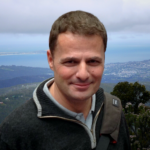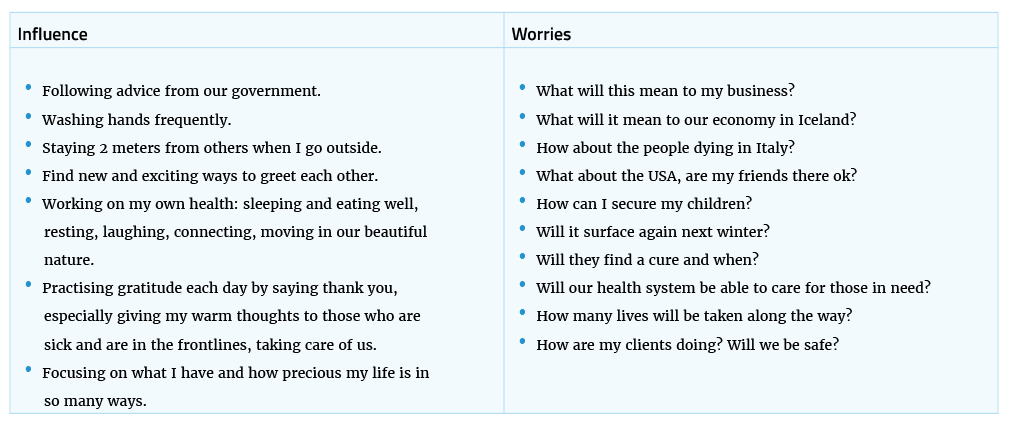
At a time in human history where good leadership at a global level is crucial for each one of us, I am pleased to present our Voice from the Field for this issue of AI Practitioner. Gudrún Snorradóttir from Reykjavik, Iceland emphasises the importance of community, especially in our world today where COVID-19 has challenged our daily living. With an appreciative lens, Gudrún provides us with a glimpse of the human spirit and how connected we all are.
The gift of the human spirit: Resilient greetings from your friends in Iceland
Gudrún Snorradóttir is an Icelandic Appreciative Inquiry practitioner and a professional certified coach (executive) based in Reykjavik, Iceland. In recent years, she has been dedicated to developing and strengthening the concept around more human leadership: combining coaching, Applied Positive Psychology and Appreciate Inquiry while working with leaders and organizations in building more humane workplaces. She is the founder and CEO of Human Leader, a company that operates from Iceland with international connections. Gudrún’s area of specialization is training for future leadership skills.
Today, as human beings, we have a joint project to manage and solve. Things are moving fast, borders are continuing to close, and the COVID-19 virus is a real threat for humankind. We, AI practitioners, have possibly never been as important: to ask the right questions, to create shared solutions and to vision a new world where human ethics are given more space. We know little, but it is sure that there is a need for a solution-based on mindset, comfort and more humanity amongst those in need and those who fear how things are escalating.
Icelanders are known for being resilient in these kinds of challenges. It seems that crises reveal the true natures of Icelanders; some even say that we are at our best when disasters hit our country, well known in global studies of the happiness measure as one of the happiest countries in the world, even when we hit the economic crisis in 2007. What is the magic behind it? It’s built on one word: community. People who care for each other, support each other and therefore have the resilience to endure hard times. Just to name some examples taking place in my country right now:
We are trusting and supporting those who are in charge and following advice from our health system. By that, we mean being responsible towards those who are in particular danger.
Healthy individuals are posting on Facebook, offering to shop for the elderly and sick and take care of their essential needs during the isolation period.
People are offering their time, money and support to reach out to those who don’t have money to buy groceries.
Restaurants are offering to deliver food to the door so that no one has to go hungry.
Television stations are combining their efforts to keep everyone well informed.
The Icelandic genetic company, deCODE, is offering all in need a COVID test, to follow how quickly the virus is spreading, and from that information decide how we can prevent the virus spreading further.
Banks, travel agencies, grocery stores and others are finding ways to take special care of those in the most danger of getting infected and aligning their services to ensure our society carries on.
Organizations are offering their employees the option to work from home, to be able to take of their families and protect the elderly and sick.
Our nurses and doctors are working day and night in a challenging environment, wanting to support and comfort those in most need.
Our whole society is finding ways to connect online. Ministers offer masses online, theatres offer free shows for the public, musicians offer free concerts, there are offers of virtual coaching and psychological help, and families keep contact with their elderly members via social media.
The examples of a healthy community are countless, and they make me proud and hopeful. On social media, we see how we rise as human beings in many ways. People in Spain gather at a set time each day to celebrate and cheer on and appreciate their health staff. Neighbours in Italy share songs from their balconies and find harmony, despite their isolation. During this time of death and suffering, the human spirit is prevailing, and it is a beautiful and precious element that we all will hold, if nourished and treasured.
In the summer of 2009, positive psychology came rushing into my life. It came at precisely the right time, moments of doubt and some personal suffering. Since then, it has been a constant love affair of a grand gesture; I’ve been fascinated to bring out the true nature of people by focusing on what works and asking the right questions. I believe in the human species. Despite robots, algorithms and all the technical solutions, humans own my heart.
Connections
Through research, you can see that there is one thing that brings us the most happiness and well-being: secure connections with others. What is most satisfying for a human being is to support and help another human being. To connect, to be seen, to be heard, to belong. From childhood, it has been my sincere belief that we are born to do good and to be good. This passion and my experience of leadership led me to research and focus on the human touch in leadership. I’ve searched to understand the challenges ahead for future leaders, as well as what kind of leadership will be needed for humans to endure. In the 21st century, change is discontinuous, abrupt and distinctly nonlinear. That has never been as true as it is today.
As those who are currently centred in the middle of the fourth industrial revolution, the leaders of today and tomorrow are faced with various challenges. What kind of challenges are we facing in our organizations and what competencies and skills do we need for those kinds of challenges? Through research, it is clear that some of these challenges are the restructuring of the workforce, skill gaps, the gig economy, an increased number of millenials in the job market, growing numbers of mental health issues and a large number of disengaged employees to which has been added the newest challenge COVID-19. These facts raise the following questions on my mind:
How will these challenges eventually change the nature of work, and what kind of leadership competencies and skills will be needed?
How do leaders prepare themselves and their employees for a mostly unknown future?
What role can Appreciative Inquiry play in years to come in forming the leaders of tomorrow?
There are some critical skills that leaders need to focus on and capture to be able to lead in the 21st century, for example: the ability to create a trustworthy environment where psychological safety plays the leading role; resilience and adaptability; and emotional intelligence and active listening, among others.
There is an acute need for leaders who have been trained for what is next – leaders who have developed their state of readiness for the unexpected.
Keeping our focus clear
How can we increase our tolerance toward these high-pressure situations and gain more tools to deal with them? I want to share with you an exercise that is very popular among my clients, especially in times of change and crises. Today, one of our primary assignments is to keep our focus clear and put our energy into the things that we can definitely control. Let’s deal with COVID-19 by drawing two columns on a piece of paper. One column we label: Influence. The other column we label: Worries. Let’s start. Here is my list:
After doing this exercise, your assignment is to choose. To choose where you put your mental energy. Which column will you “nourish” with your attention? The choice is yours, and it’s a beautiful as well as a frightening thing to realize.
The time has arrived. What will be your gift of AI approach in these challenging times? I do wish you and everybody the courage and confidence to be our best selves because surely there’s never been a better time to put all that learning into practice.
With much love and respect from your fellow AI practitioner in Iceland,
Gudrún

Keith is a registered psychologist with the Psychology Board of Australia (PsyBA) and associate fellow with the Australasian College of Health Service Management (ACHSM). He has designed and implemented health and wellbeing frameworks across the community, health and education sectors. Keith’s current focus is on developing his work in Appreciative Dialogue (ApDi) to assist individuals in moving from self-doubt to inspired positive action.



